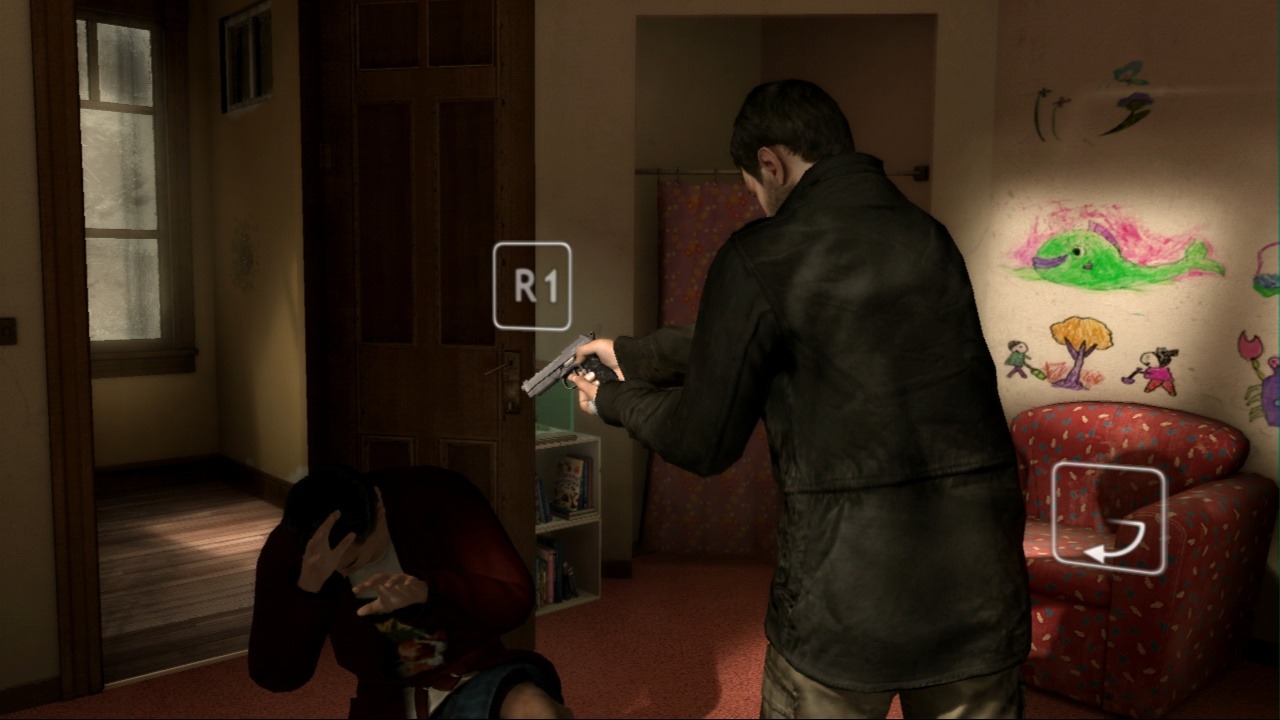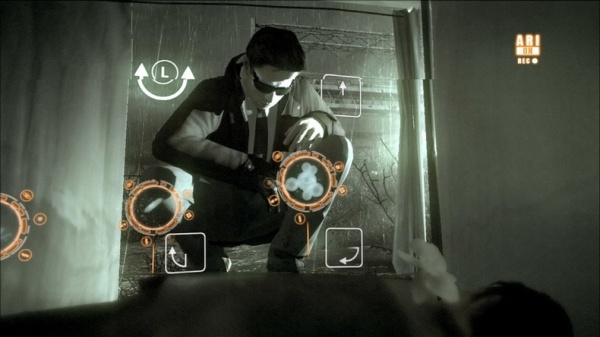 |
| (From left to right) Norman Jayden, Madison Paige, Ethan Mars, and Scott Shelby |
The setting revolves around a town resembling Philadelphia, where a serial killer named the Origami Killer kidnaps little boys around the age of 9 to 13, drowns them in rainwater, and leaves them with an orchid on their chest and an origami figure in their right hand. The story is told from the perspective of four playable characters:
Ethan Mars is an architect who suffers from depression after losing his son Jason two years before the events of the game. One day, while at a park with his son, Shaun, he suffers a blackout without anybody noticing and when he comes to, Shaun disappears. He is eventually being tested by the Origami Killer on how far he is able to go to save his son by taking part in trials, each representing danger, suffering, painful suffering, murder, and sacrifice.
Norman Jayden is an FBI agent who takes part in the Origami Killer case, while at the same time, has to overcome his addiction to a drug called Triptocaine. He is equipped with augmented reality glasses called ARI, or "Added Reality Interface", which allows him to rapidly investigate crime scenes and record clues handy in searching for the Origami Killer. He is aided by a detective named Carter Blake, a character that you want to punch in the face because of how much of a jerk he is.
Madison Paige is a photographer who suffers from insomnia and has a lot of nightmares that she checks into motels in order to actually sleep. She becomes involved in the Origami Killer case, conducting her own investigations. Oftentimes she will run into Ethan, mending his wounds whenever he returns to the same motel after a trial.
Scott Shelby is an asthmatic private detective and former police officer also conducting his own investigation on the Origami Killer. He visits the parents of the Killer's victims and obtains items from them. He is later aided by Lauren Winter, the mother of one the Killer's victims, in hopes of tracking the Killer down.
Like the temperature motif in its spiritual predecessor, Fahrenheit, the rain motif plays a part in the narrative because Shaun is in danger of being drowned in rainwater and as the story progresses, the height (in inches) increases.
 |
| You can either kill this guy or just walk away. Doing any one of those will have consequences in the game and to you, personally. |
Also like its predecessor, it has a really depressing atmosphere due to the setting in which there is a lot of rain in the fall and we see the poorer side of society which perfectly captures the tone. In order to feel totally immersed in the game, I recommend playing the game on a rainy day.
The gameplay from Fahreheit is carried over, where you control each character, interacting with the environment, like drinking, using the bathroom, and opening doors, to name a few. This is done by using the right analog stick when there is a context senstive icon. When you see an icon with dotted lines, for example, you have to move the right stick slowly. The quick-time events occur when there is an action sequence, but not in form of the Simon game, but just what face or shoulder buttons to press. You can also gain access to each characters' thoughts by holding the L2 button and pressing any of the face buttons to hear what they are thinking.
In addition, there are also motion controls in which you can use the SIXAXIS controller or, after a patch, the PlayStation Move controller. If you're not a fan of motion controls, you can adjust the settings to turn them off.
 |
| Example of ARI gameplay |
When talking to NPCs, you have a limited time to pick a dialogue branch for the playable character to speak. If you don't pick a dialogue branch in time, the character will randomly pick one.
Unlike Fahrenheit, when a playable character dies, the story continues regardless, affecting the narrative and the ending. This really ties in with director David Cage's intention that the game is meant to be played only once "...because that's life. Life you can only play once... because it's going to be your story. It's going to be unique to you. It's really the story you decided to write."
But for completionists like myself, there are multiple endings in the game, giving a lot of replay value for those who want to get the Platinum trophy. It lets you explore alternate solutions on what you could have done instead of what you originally did in the game.
 |
| "Jason! JASON! SHAUN!!" |
 |
| Normand Corbeil, the game's composer. |
Does the game have its share of flaws? Yes, but they are all nitpicks and things that bothered me personally:
- I don't understand why I have to hold R2 in order for the character to walk or run and use the left stick to move while holding R2. In Fahrenheit, you just use the left stick to move, with an option to run by holding X (PS2) or A (Xbox) buttons.
- There is one plot hole that always gets to me and those are Ethan's blackouts. How does Ethan get them and suddenly arrive in a street when he gains consciousness? It's never really explained.
- The scene where Madison has to strip tease in front of a pervert made me feel really dirty and I dread that chapter every time I play it.
- Some awkward voice acting, but they're fairly minor and they don't break the game for me.
- It has nothing to do with the main story, but is Quantic Dream going to release the last of the Heavy Rain Chronicles DLC packs? It feels incomplete when we only have "The Taxidermist" story.
It's hard to say whether I prefer Fahrenheit or Heavy Rain because both games have their ups and downs, and are also very similar to one another in terms of gameplay, atmosphere, characters and storytelling.
I have concluded the Quantic Dream retrospective. And it's pretty obvious that I'm looking forward to their next game, Beyond: Two Souls. What will it bring to the table? We can only find out when we play it once it hits stores this week.
No comments:
Post a Comment